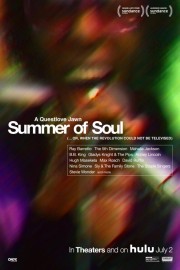Summer of Soul (…Or, When the Revolution Could Not Be Televised)
**Seen at the 2021 Sundance Film Festival.
First of all, let me say thank you to the person who kept the footage of the 1969 Harlem Cultural Festival in their basement for 50 years; I don’t know if you know about film preservation and restoration, but holy shit does this look as good as it must have when it was shot in the summer of ’69. I’m sure there was quite a bit of restoration done by Ahmir-Khalib Thompson (aka Questlove) and his crew in putting together this documentary, but there’s no guarantee footage from 1969 would look this good now. That’s just one of the reasons to watch this film.
Watching “Summer of Soul,” it’s almost impossible not to think about 1970’s “Woodstock” documentary, long seen as one of the greatest concert films of all-time. The two events took place in the same year, about 100 miles away from one another, and seemed to capture a moment for their audiences. “Woodstock” has lionized a generation, and glorified a financial disaster, but the Harlem Cultural Festival deserves as much of a reputation. Put on for free by an enterprising promoter by the name of Tony Lawrence, the festival seemed to be a response to the unrest the previous summer after the murders of Martin Luther King Jr. and Robert Kennedy, and after a decade of blood, sweat and tears fighting for Civil Rights, leading into Vietnam, and a disproportionate amount of African-American men fighting and dying for a country that did not respect them. Watching it now, it’s hard to imagine a more joyous occasion in a more tumultuous time; Woodstock, by comparison, looks like it was a slog to sit through, and not just because of the rain and mud it took place in.
The music in this movie is worth the price of admission alone. Stevie Wonder, not just playing the keyboard but playing drums(?!?) like a man possessed. The 5th Dimension with my favorite version of “Aquarius/Let the Sunshine In” I’ve ever heard. Sly and the Family Stone with some energetic versions of “Higher” and “Everyday People.” The gospel sounds of The Edwin Hawkins Singers. Gladys Knight & the Pips. And finally, Nina Simone, with a set of force and feeling that leaves the audience feeling ready to move forward in a country that always seems set to move them backwards.
While a part of me wishes this were a true “fly on the wall” documentary chronicling the Festival a la “Woodstock,” having this film be a retrospective look back at the festival works for a number of reasons. We hear from both a man who was at the Festival, and the drummer of Sly and the Family Stone, and get two different perspectives on their impact playing the festival. We are able to get the Festival placed in its perspective not just in Black history, but also how it, and its artists, fit in the larger context of Harlem itself. Seeing footage of the moon landing, which happened at the same time as the Festival, and the contrast of how the people in the crowd see the importance of the moon landing compared to the suffering in their own community, is of tremendous insight and purpose. Most poignantly, though, we get to see people like Marilyn and Billy from The 5th Dimension are watching themselves play the Festival after 50 years. That moment right there gets to the power of music, the power of memory, and the power of cinema. It takes a real artist to be able to do that in a documentary; Thompson is the real deal, and I cannot wait to rewatch his film again, maybe with a live audience, in a movie theatre; I can’t imagine it not hitting all the right notes.










